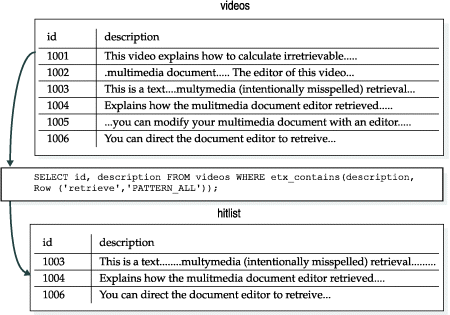Pattern search
A pattern search is a fuzzy search that takes into account multiple transpositions and substitutions and also returns any substrings or superstrings of the clue.
A superstring pattern match is when the clue is found within a
larger word, such as when a search for the clue edit returns editable.
A substring pattern match is when part of the clue is found within
a smaller word, such as when a search for the clue irretrievable returns retrievable.
To enable a pattern search, you pass the PATTERN_ALL tuning parameter to the search engine.
retrieve,
execute the following SQL statement: SELECT id, description FROM videos
WHERE etx_contains(description,
Row ('retrieve','PATTERN_ALL'));retrieved, retrieval,
or retreive. Because of the high default word score
threshold of 70, the word irretrievable is not found.
However, if you use the WORD_SCORE tuning parameter to set the word
score lower, the word irretrievable might be returned. 
A pattern search differs from a substitution or a transposition search in that a pattern search allows multiple substitutions and transpositions. A substitution search returns words that differ from the clue by a single substitution. For example, a search for the word travel with PATTERNS_SUBS set might return gravel. A transposition search returns words that contain a single transposition. For example, a search for the word travel with PATTERN_TRANS set might return travle.
In contrast, a search for the same clue with PATTERN_ALL enabled returns words such as traveled, travelled, unraveled, and travvel, in addition to gravel and travle. The text search engine assigns a higher word score to words matched with PATTERNS_SUBS or PATTERN_TRANS enabled than it does to words that are matched with PATTERN_ALL enabled.
If you want to enable basic pattern matching, use the PATTERN_BASIC tuning parameter. The search might return transpositions, substitutions, and superstring and substring pattern matches, depending on the value of WORD_SCORE.
The PATTERN_ALL tuning parameter is equivalent to specifying the three parameters PATTERN_BASIC, PATTERN_SUBS, and PATTERN_TRANS at once.